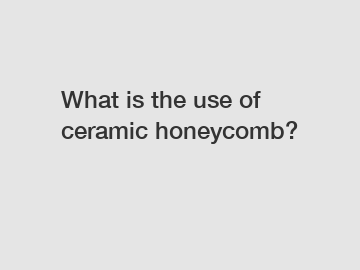What is the use of ceramic honeycomb?
What is the use of ceramic honeycomb? Discover the applications and benefits!
Ceramic honeycombs have gained popularity in various industries due to their unique structure and remarkable properties. But what exactly is the use of ceramic honeycomb, and how does it benefit different applications? In this article, we will delve into the fascinating world of ceramic honeycombs and explore their diverse uses.
1. Catalytic Converters:

One of the most common uses of ceramic honeycombs is in catalytic converters. These devices are utilized in the exhaust systems of vehicles to reduce harmful emissions. The ceramic honeycomb structure provides a large surface area for the conversion of toxic gases into less harmful substances through catalytic reactions. The honeycomb channels help to evenly distribute the exhaust gases, maximizing contact between the gases and the catalyst, and thus enhancing the conversion efficiency.
2. Thermal Insulation:
Ceramic honeycombs also find extensive use in thermal insulation applications. The unique structure of the honeycomb allows for excellent heat retention and energy conservation. By trapping air within its cells, ceramic honeycombs create an effective barrier against heat transfer. This quality makes it a preferred choice for insulation in various industries, including aerospace, automotive, and construction. Whether it's insulating furnaces, engines, or buildings, ceramic honeycombs play a crucial role in maintaining energy efficiency and reducing heat loss.
3. Filtration:
Another important application of ceramic honeycombs is in filtration systems. Due to their porous structure, ceramic honeycombs effectively trap and remove impurities from gases or liquids. The precisely engineered channels within the honeycomb provide a means for efficient filtration without causing excessive pressure drops. This makes ceramic honeycombs suitable for various filtration processes, such as air purification, water treatment, and gas separation in industries ranging from pharmaceuticals to petrochemicals.
4. Heat Recovery:
In addition to thermal insulation, ceramic honeycombs excel in heat recovery systems. By employing a counter-flow heat exchange design, waste heat can be transferred to incoming fluids or gases. This allows for energy-saving in various industrial processes, such as air conditioning, power generation, and manufacturing. Ceramic honeycombs efficiently transfer heat between the hot and cold fluid streams, optimizing overall energy utilization.
5. Structural Support:
The robust and lightweight nature of ceramic honeycombs makes them an ideal choice for providing structural support in different applications. In industries like aerospace and automotive, ceramic honeycombs are used to reinforce composite materials, making them stronger and more durable without adding excessive weight. The high strength-to-weight ratio of ceramic honeycombs ensures the integrity of the structure while minimizing the overall mass.
6. Noise Reduction:
Ceramic honeycombs also contribute to noise reduction in various industries. When structured as an absorptive panel, these honeycombs can effectively dampen sound waves, reducing noise levels in buildings, vehicles, or industrial machinery. By converting sound energy into heat through acoustic absorption, ceramic honeycombs help create a quieter and more comfortable environment.
In conclusion, the use of ceramic honeycombs extends to various fields, thanks to their exceptional properties. From catalytic converters and thermal insulation to filtration systems and structural support, their versatility is undeniable. Whether it is reducing emissions, conserving energy, or even creating a more peaceful environment, the applications of ceramic honeycombs continue to evolve and benefit numerous industries. So next time you come across the question, "What is the use of ceramic honeycomb?," think of the catalytic converter in your car or the insulation in your house – this remarkable material is playing a vital role in shaping our lives.
If you want to learn more, please visit our website fiberglass filter bags, Fiberglass Bags, zirconia ceramic foam filter.
233
0
0

Comments
All Comments (0)